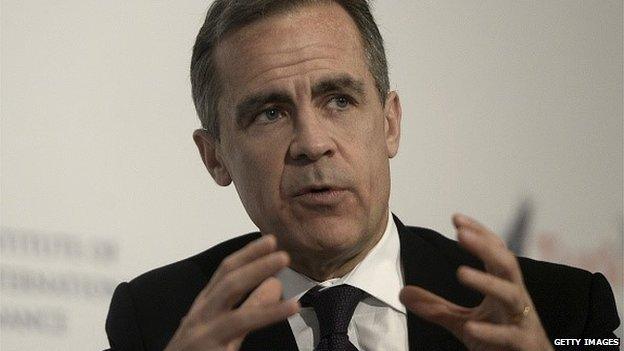Bank of England's Mark Carney: Low inflation temporary
- Published

The Bank of England governor says low inflation is temporary and will return to its 2% target within two years.
"What's important is that workers and businesses understand this is a temporary phenomenon," Mark Carney told MPs.
He said the nine-strong Monetary Policy Committee would "bring it back to the target in a reasonable horizon", which he said would be within two years.
Inflation stood at 0.3% in January, well below the Bank's 2% target.
The figure marks the lowest rate of UK Consumer Prices Index inflation since estimates of the measure began in 1988.
Mr Carney said that three-quarters of the current weakness in inflation was due to falling prices of oil and food, which he said was a "temporary, one-off development".
He also said there was no evidence of "deferred consumption" - in other words, people putting off purchases in the belief that prices could fall further, a potential threat to economic growth.
Ready to act
Mr Carney stressed that if there was any evidence of a sustained fall in inflation, the Bank could "if necessary" cut interest rates from their current 0.5% low to zero, but he emphasised that the "focus of policy is towards tightening".
Mr Carney said earlier this month that inflation in the UK could temporarily turn negative in the spring because of falling oil prices.
The Bank's base rate has been at a record low of 0.5% for nearly six years. Markets are currently expecting an interest rate rise in early 2016.
However, in written evidence to the Treasury Select Committee, Martin Weale, one of two members of the MPC to have voted to raise interest rates late last year, said it "may be appropriate to raise Bank Rate rather earlier than financial markets currently anticipate".
His warning chimed with an earlier speech by MPC member Kristin Forbes, who said there were risks to the economy if interest rates remained at their record low rate for too long.
She said a rate hike might be needed "in the near future".